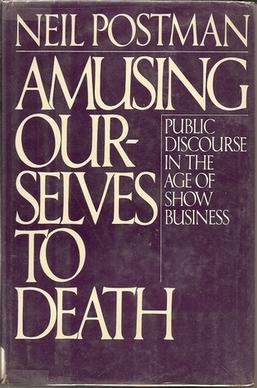

For instance, people in the 1860s were captivated for 4 or 5 hours at a time by the meticulously reasoned debates between Stephen Douglas and Abraham Lincoln. As a result, people would gather in droves to hear lectures and debates. All people recognized the value of knowledge. Reading and writing were valued greatly for many reasons, not the least of which was that people could read the Bible. The reader must persevere during the first two chapters because his reasoning, though tight, can tend to be somewhat thick.Beginning with chapter three, Postman gives a historical survey of America's way of thinking, as dictated by its forms of communication. He demonstrates that the Jewish concept of God, with their application of the second commandment, taught them a very high form of abstract thinking. For instance, "`Seeing is believing' has always a preeminent status as an epistemological axiom, but `saying is believing,' `reading is believing,' `counting is believing,' `deducing is believing,' and `feeling is believing' are other that have risen or fallen in importance as cultures have undergone media change" (24). Though it was published in 1985, it has equal, if not more, relevance to us today.To begin, Postman argues that every medium of communication carries with it an epistemology, a theory of knowledge. By doing so, he contends that a culture based on words is superior to one based on pictures. Based on this premise, Postman demonstrates the dumbing influences that the television has had upon modern American minds. Those forms themselves either taint or enhance the message. The forms of media are not merely neutral channels through which facts and ideas flow. In other words, the way something is communicated controls what is actually being communicated. In his eye-opening work, he demonstrates "how forms of public discourse regulate and even dictate what kind of content can issue from such forms" (6). Neil Postman's thesis in Amusing Ourselves to Death is simple. So I am no newcomer to this field of media criticism. And while I was not watching television, I read through much of "Teaching As A Subversive Activity" by Neil Postman and Charlie Weingartner. That dare to an adolescent boy was too good to pass up. When I was about age 14, and in junior high school, I took a media class where the teacher dared us to not watch television for the remainder of the trimester. I like his attention to detail, without smothering the reading with esoteric, I'm-smarter-than-you nonsense. His assertions are critical and probative, but always with a sense of humanity, looking out for us. I like the many lessons and tutorials in each and every chapter. He is writing to me, but including all other listeners. This is an indictment that Postman has laid down and, so far as I can see, an irrefutable one.I like this book for many reasons.

“A brilliant, powerful, and important book. It is also a blueprint for regaining control of our media, so that they can serve our highest goals. Amusing Ourselves to Death is a prophetic look at what happens when politics, journalism, education, and even religion become subject to the demands of entertainment. Now, with television joined by more sophisticated electronic media-from the Internet to cell phones to DVDs-it has taken on even greater significance. Originally published in 1985, Neil Postman’s groundbreaking polemic about the corrosive effects of television on our politics and public discourse has been hailed as a twenty-first-century book published in the twentieth century. "It's unlikely that Trump has ever read Amusing Ourselves to Death, but his ascent would not have surprised Postman.” - CNN What happens when media and politics become forms of entertainment? As our world begins to look more and more like Orwell's 1984, Neil's Postman's essential guide to the modern media is more relevant than ever.


 0 kommentar(er)
0 kommentar(er)
